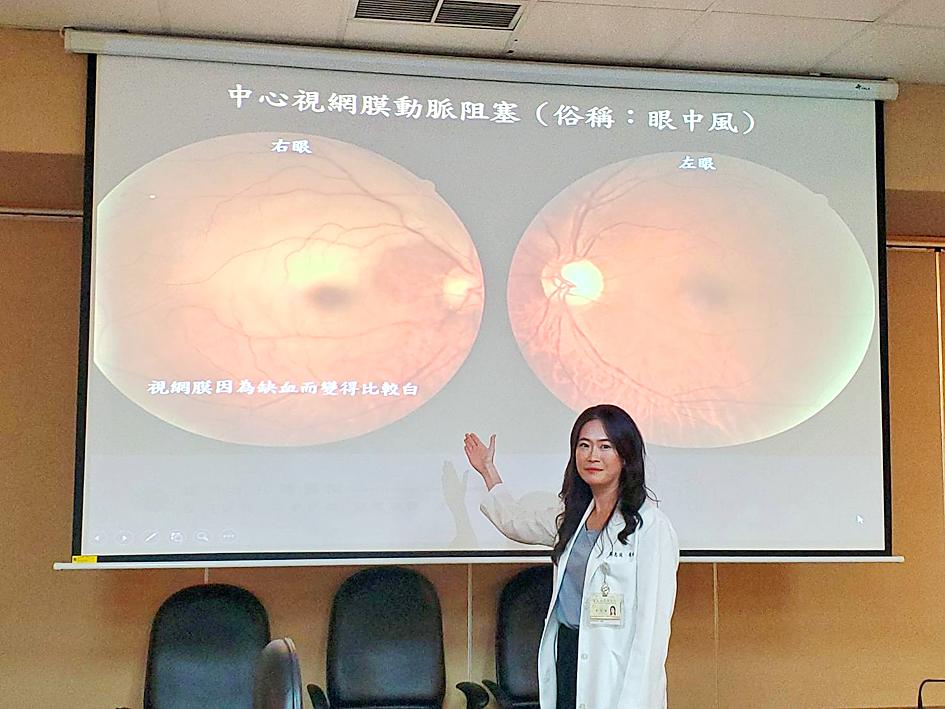Exposure to air pollution can cause a person to be 2.16 times more likely to experience eye strokes, which can cause vision loss, researchers in Taipei said yesterday.
Analyzing National Health Insurance Administration data and data from air-quality and weather sensors nationwide, a team of researchers from Taipei Veterans General Hospital, National Yang-Ming University, and Yuan Ze University found a correlation between air pollution and the occurrence of eye strokes.
An increase of air pollution over a one-week period by just one part per billion can cause those exposed to be 1.1 times more likely to experience an eye stroke, the team said.

Photo: Lin Hui-chin, Taipei Times
Diabetics, people with high blood pressure, high cholesterol or other pre-existing conditions face an even higher risk: They are 1.4 to 2.16 times as likely to have an eye stroke, the team said.
Neuro-ophthalmologist Cheng Hui-chen (鄭惠禎) said that eye strokes occur when there is insufficient blood flow to the tissues in the front part of the optic nerve, and while such strokes are sudden and painless, they can result in serious vision loss.
One patient she treated, a 67-year-old man, had lost the sight in his right eye, due to a lack of blood flow to the eye, she said.
Fortunately, using angiography, injections to dissolve blood clots in the optical arteries and hyperbaric oxygen therapy, doctors were able to largely restore the man’s vision, Cheng said.
Doctors already know about the link between air pollution and an increased risk of conjunctivitis, xerophthalmia (abnormal drying of the eye), retinal-vein occlusion and other conditions, but the research team hoped to expand upon those findings with their project, she said.
In the study, the team looked at 93 patients who had experienced eye strokes between 2001 and 2013, and compared their details with the data from 603 weather sensors and 78 air-quality sensors near the patients’ homes, she said.
The team found that an increase in air pollutants such as nitrogen dioxide, sulfur dioxide and fine particulate matter of 2.5 micrometers (PM2.5) or PM10 correlated with a significant increase in the rate of eye strokes, she said.
Air pollutants can enter the optical veins through the respiratory tract, passing from the veins in the lungs to those in the eyes through the circulatory system, and causing blockages when they reach the eyes, she said.
One way to reduce the risk of eye strokes is to reduce exposure to air pollution by using public transportation instead of riding scooters, she said.
The elderly and those with preexisting conditions should also wear masks on days when pollution levels are high, she said.

‘DENIAL DEFENSE’: The US would increase its military presence with uncrewed ships, and submarines, while boosting defense in the Indo-Pacific, a Pete Hegseth memo said The US is reorienting its military strategy to focus primarily on deterring a potential Chinese invasion of Taiwan, a memo signed by US Secretary of Defense Pete Hegseth showed. The memo also called on Taiwan to increase its defense spending. The document, known as the “Interim National Defense Strategic Guidance,” was distributed this month and detailed the national defense plans of US President Donald Trump’s administration, an article in the Washington Post said on Saturday. It outlines how the US can prepare for a potential war with China and defend itself from threats in the “near abroad,” including Greenland and the Panama

A wild live dugong was found in Taiwan for the first time in 88 years, after it was accidentally caught by a fisher’s net on Tuesday in Yilan County’s Fenniaolin (粉鳥林). This is the first sighting of the species in Taiwan since 1937, having already been considered “extinct” in the country and considered as “vulnerable” by the International Union for Conservation of Nature. A fisher surnamed Chen (陳) went to Fenniaolin to collect the fish in his netting, but instead caught a 3m long, 500kg dugong. The fisher released the animal back into the wild, not realizing it was an endangered species at

The High Prosecutors’ Office yesterday withdrew an appeal against the acquittal of a former bank manager 22 years after his death, marking Taiwan’s first instance of prosecutors rendering posthumous justice to a wrongfully convicted defendant. Chu Ching-en (諸慶恩) — formerly a manager at the Taipei branch of BNP Paribas — was in 1999 accused by Weng Mao-chung (翁茂鍾), then-president of Chia Her Industrial Co, of forging a request for a fixed deposit of US$10 million by I-Hwa Industrial Co, a subsidiary of Chia Her, which was used as collateral. Chu was ruled not guilty in the first trial, but was found guilty

DEADLOCK: As the commission is unable to forum a quorum to review license renewal applications, the channel operators are not at fault and can air past their license date The National Communications Commission (NCC) yesterday said that the Public Television Service (PTS) and 36 other television and radio broadcasters could continue airing, despite the commission’s inability to meet a quorum to review their license renewal applications. The licenses of PTS and the other channels are set to expire between this month and June. The National Communications Commission Organization Act (國家通訊傳播委員會組織法) stipulates that the commission must meet the mandated quorum of four to hold a valid meeting. The seven-member commission currently has only three commissioners. “We have informed the channel operators of the progress we have made in reviewing their license renewal applications, and